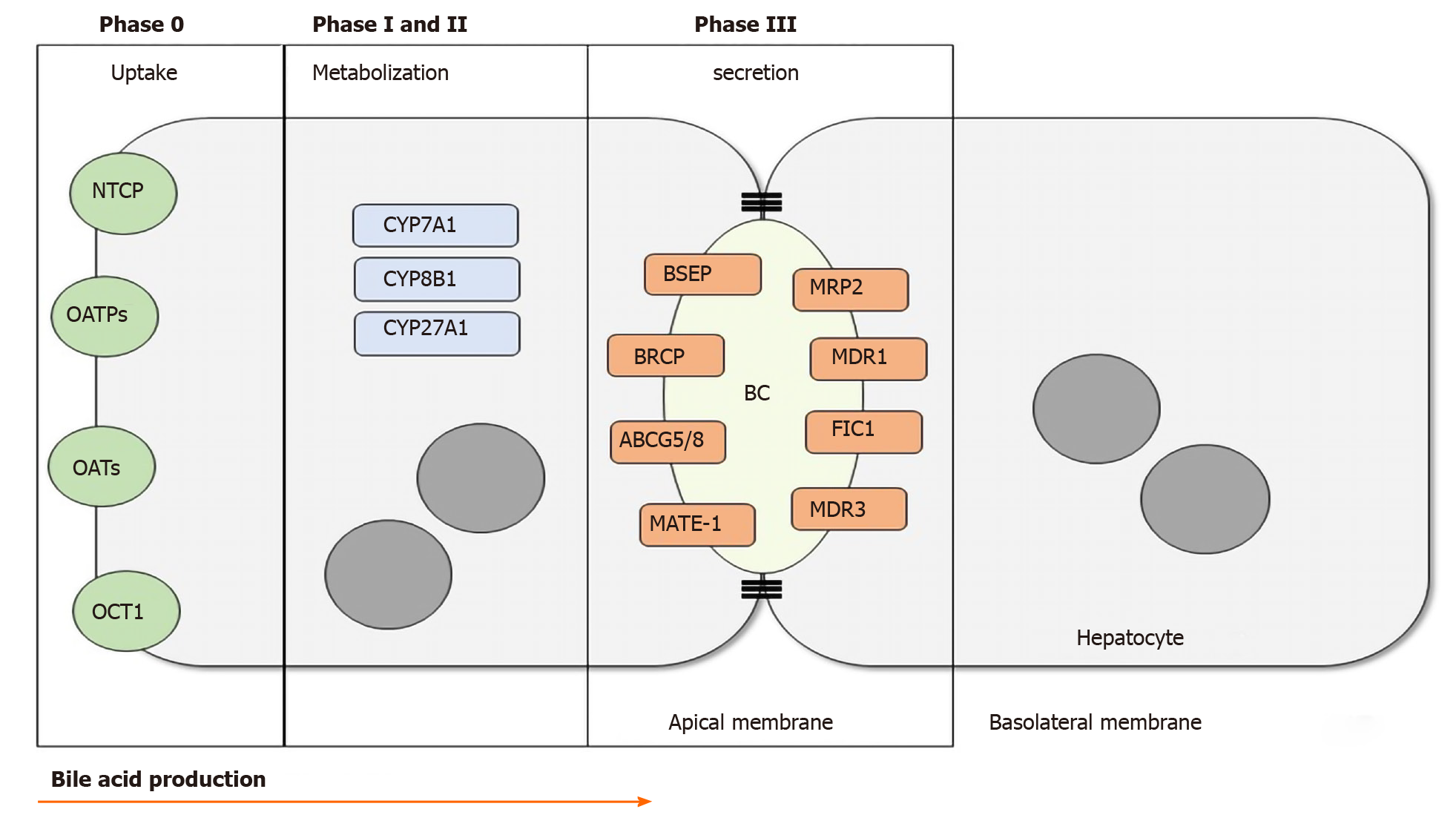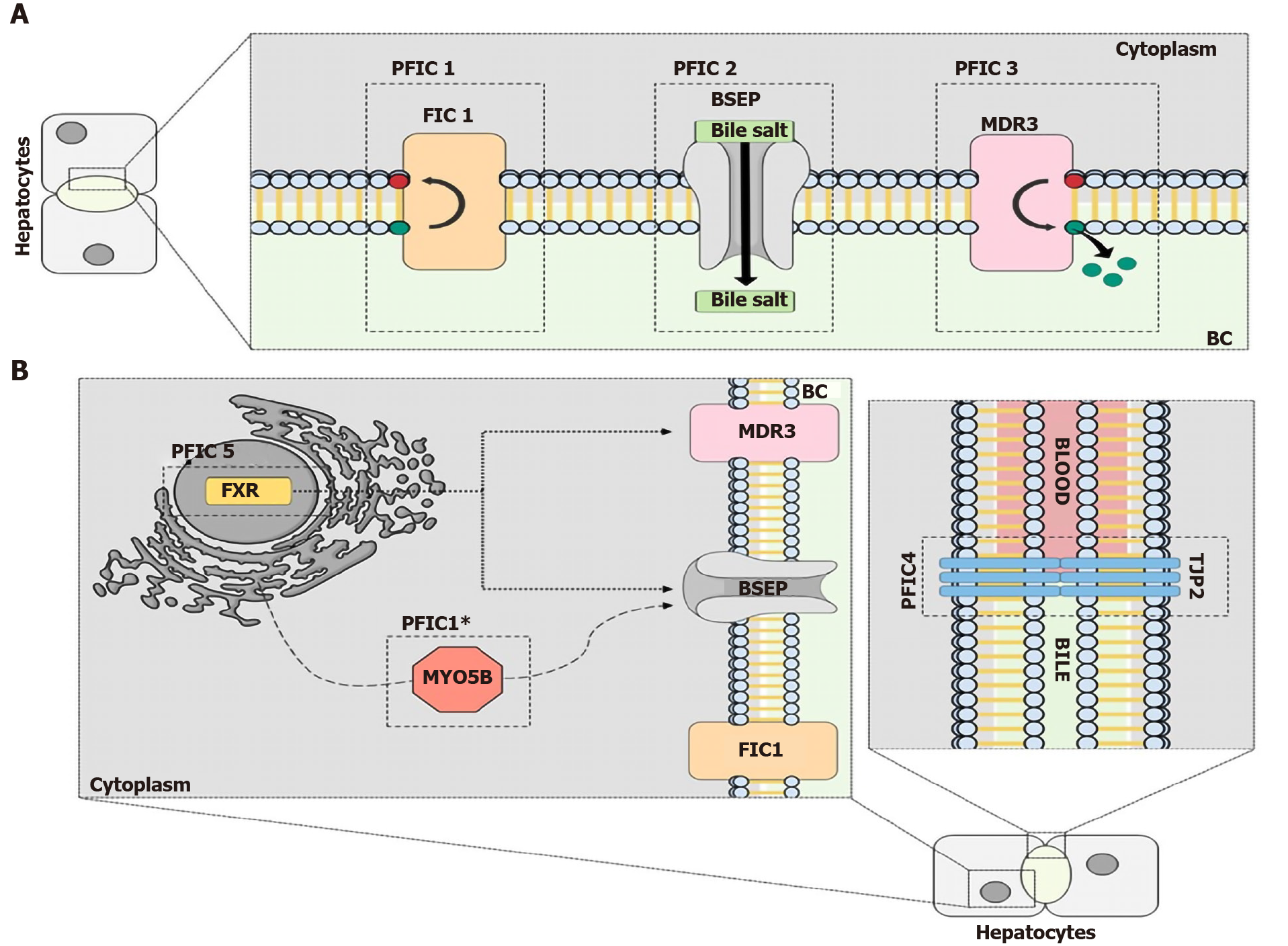Copyright
©The Author(s) 2020.
World J Gastroenterol. Dec 21, 2020; 26(47): 7470-7484
Published online Dec 21, 2020. doi: 10.3748/wjg.v26.i47.7470
Published online Dec 21, 2020. doi: 10.3748/wjg.v26.i47.7470
Figure 1 Bile acid production.
In phase 0, bile acids and other organic products are transported through the basolateral membrane of the hepatocyte. Phase I and II take place in the cytoplasm through activation and metabolization of differents CYPs. In phase III the bile acids are secreted into the biliary canalicus by the transmebrane transporters. NTCP: Na+-taurocholate cotransporting polypeptide; OATPs: Organic anion transporting polypeptides; OATs: Organic anion transporter; OCT1: Organic cation transporter 1; CYP7A1: Cytochrome P450 Family 7 Subfamily A Member 1; CYP8B1: Cytochrome P450 Family 8 Subfamily b Member 1; CYP27A1: Cytochrome P450 Family 27 Subfamily A Member 1; BSEP: Bile salt export pump; BRCP: Breast cancer resistance protein; ABCG5/8: ATP-binding cassette sub-family G member 5/8; MATE-1: Multidrug and toxin extrusion 1; MRP2: Multidrug resistance-associated protein 2; MDR1: Multidrug resistance class 1 glycoprotein; FIC1: Familial intrahepatic cholestasis 1; MDR3: Multidrug resistance class 3 glycoprotein; BC: Biliary canaliculus.
Figure 2 The molecular mechanisms behind progressive familial intrahepatic cholestasis.
A: The classic types of Progressive Familial Intrahepatic Cholestasis (PFIC). PFIC 1 is related to mutations in the genes that encode the flippase familial intrahepatic cholestasis 1, which flips phospholipids in the plasma membrane. Mutations in the bile salt export pump (BSEP) protein, a bile salt transporter, results in PFIC 2. The third type of PFIC is caused by mutations in the gene that encodes the Multidrug resistance class 3 glycoprotein (MDR3) protein, another lipid flippase; B: The newer types of PFIC. Mutations in the tight junction protein-2 protein, which prevents the mixing of blood and bile acids, are responsible for PFIC 4. PFIC 5 is a result of mutations in the farnesoid X receptor protein, a transcription factor important for BSEP and MDR3 ecpression. Mutations in Myosin VB result in a PFIC phenotype because the trafficking of the BSEP protein from the endoplasmic reticulum to the plasma membrane is disrupted. PFIC: Progressive Familial Intrahepatic Cholestasis; FIC1: Familial intrahepatic cholestasis 1; BSEP: Bile salt export pump; MDR3: Multidrug resistance class 3 glycoprotein; TJP2: Tight junction protein-2; FXR: Farnesoid X receptor.
- Citation: Amirneni S, Haep N, Gad MA, Soto-Gutierrez A, Squires JE, Florentino RM. Molecular overview of progressive familial intrahepatic cholestasis. World J Gastroenterol 2020; 26(47): 7470-7484
- URL: https://www.wjgnet.com/1007-9327/full/v26/i47/7470.htm
- DOI: https://dx.doi.org/10.3748/wjg.v26.i47.7470










